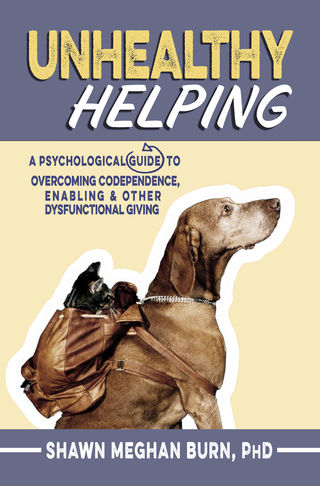Codependency
What Is Healthy Helping and Giving?
Having the will and the skill to set appropriate helping and giving boundaries.
Posted August 1, 2016
Helping and giving are key to human survival and well-being. Yet as documented in Unhealthy Helping: A Psychological Guide to Overcoming Codependence, Enabling, and Other Dysfunctional Giving, the helping and giving road may be paved with good intentions, but that doesn’t mean it’s not rocky. Our helping and giving can enable, create relationship problems, be part of unhealthy codependent relationships, exhaust our resources, and lead to our being taken advantage of by rotten, addicted, or immature takers. A one-time offer of help can morph into an unintended long-term obligation. You don’t even have to be codependent to encounter a helping and giving challenge.
But the solution to common helping and giving dilemmas isn’t to stop helping and giving. Human survival will always depend partly on people taking care of one another. People sometimes need our help to overcome undeserved hardship or to change their lives. With our support, determined, persistent people achieve their life goals. A circle of giving in a group or community insures the success of individuals and groups. Good organizational citizens promote productivity and contribute to positive workplace environments.
Helping and giving dull the sharp edges of a world where innocent people are victims of serious illness, poverty, war, and crime. Helping and giving are human strengths and weapons against the many arbitrary and malevolent dark forces that plague human existence.
We also personally benefit from helping and giving. Helping and giving can provide life with meaning and purpose and can boost our mood, express our values, and connect us to something greater than ourselves. That’s why it’s important to master the art of helping and giving.
Healthy givers know the differences between healthy and unhealthy helping and giving. They help in ways that empower rather than enable. They don’t create or support unhealthy dependencies and their aid doesn’t reduce others’ self-confidence, competencies, and life skills. Healthy givers support others in seeking professional treatment for mental or physical health rather than making accommodations that make it easier for them to put it off. They don’t try to fix people with complicated problems who don’t want to be fixed by trying to control or micromanage their change. They accept that others may not be ready or willing to change their lives.
Healthy helpers don’t provide unsolicited and unwanted advice and task assistance.They tailor their helping and giving to the recipient since what is considered helpful may depend on both the situation and the person. They help and give in sustainable ways that don't exceed their physical, emotional, or material resources.
Healthy givers give often and openly, but are alert to the red flags warning of unhealthy helping. They are willing to pull back when the signs of unhealthy helping and giving appear.
Healthy givers don’t give to “takers,” those immature, addicted, or personality disordered people that are manipulative, selfish, and willing to take advantage. They withdraw their help when recipients violate numerous agreements, require many bailouts, and use their help and giving to repeatedly escape responsibility. They give time-limited aid that help people progress in their lives or recover from disaster rather than help that creates long-term dependency.
Healthy givers have the will and the skill to set appropriate helping and giving boundaries. They know when and how to say no and how to terminate unhealthy helping and giving arrangements.
Of course, this is all sometimes easier said than done. Helping and giving behavior and helping and giving relationships are complicated. For more information on understanding and transforming unhealthy helping into healthy helping see my book, Unhealthy Helping: A Psychological Guide to Overcoming Codependence, Enabling, and Other Dysfunctional Giving. (Ebook available for Kindle, iBook, Kobu, and Nook readers).
Also see my blogs on unhealthy helping and giving:
When Good Intentions Aren’t Enough
How to Help Someone In An Abusive Relationship
Are You A Codependent Beast of Others’ Burdens?
How Helping A Friend Can Go Horribly Wrong
12 Signs You’re Giving Too Much
Does Codependence Run In Your Family?
Codependent and Unhealthy Helping Mindtraps
Personality and Relationships Made In Codependence Hell
Are You In A Codependent Relationship?
Parents of Grads, Beware of the Enabling Zone



